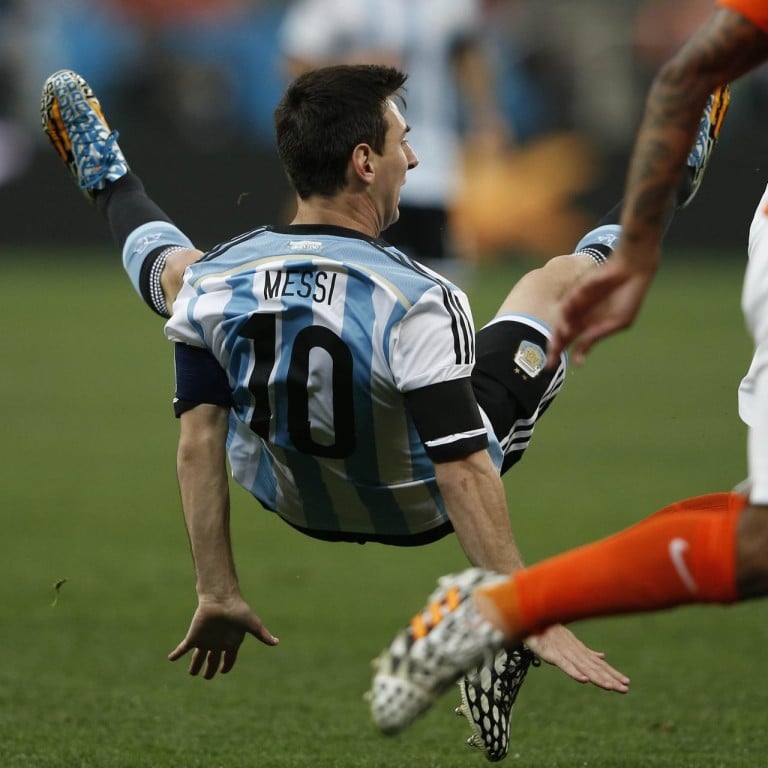
Last chance to make this 'Lionel Messi's tournament'
Argentina playmaker's wizardry for Barcelona singles him out as one of the game's greats, but he has yet to take biggest stage of all by storm
The World Cup can only hope Lionel Messi is leaving his best for last.
In the most important World Cup match to date in his epoch-shaping career, football's superstar was neither super nor a star. The four-time world player of the year was a bystander, not a decisive protagonist, for large chunks of Wednesday's semi-final, his first on football's biggest stage.
The match dragged on into extra time and then still finished 0-0 in large part because Messi failed to leave his mark on it as he has done on hundreds of others for Barcelona, his club, but rarely for Argentina, his country, which now needs him to step up.
Nigel de Jong can claim much of the credit for keeping Messi out of the action under damp, dark skies
In the penalty shoot-out, Messi did score the all-important nerve-steadying first goal that his teammates then built on, heaping intolerable pressure on the Netherlands after its first taker, Ron Vlaar, saw his effort saved.
But Messi's contribution to Argentina's win pretty much started and stopped there.

His thousands of fans in the Sao Paulo crowd chanted "Ole, ole, ole, Messi, Messi!" But he did not really do anything to deserve it.
Bottom line: Messi needs to be spectacular in the final against Germany on Sunday if he is to put his stamp on World Cup history like Diego Maradona.
Pub debates about who was/is a better footballer - Messi, Maradona or Pele - are always entertaining, but ultimately can't be answered: because these judgments are very much a personal thing, because the three of them played in different eras and because their careers took different arcs.
Still, at this stage of the 1986 World Cup, Maradona was pretty much winning the thing single-handedly. Captain of Argentina, just like Messi, Maradona scored both goals against Belgium in the semi-final, carrying the team to the final where they beat West Germany, 3-2.
Maradona also scored both Argentina goals to eliminate England 2-0 in the quarter-finals. The first was the infamous "Hand of God", punched in with his raised fist; the second was a gem after a sublime dribble past five England players.
Messi, on the other hand, has not scored since the group stage here in Brazil. He scored in Argentina's win against Bosnia in their opening match and made a splash with a fabulous injury-time winner against Iran. He also got Argentina's first two goals in a 3-2 victory against Nigeria.

Since then, zilch. Just an assist for Angel di Maria's winning goal against Switzerland in the first knockout game. It does not add up to enough to put Messi on a higher pedestal than Maradona. We can have this conversation again if he scores the goals that beat Germany in the final.
Nigel de Jong can claim much of the credit for keeping Messi out of the action under damp, dark skies in Wednesday's semi-final, which felt flat compared to the previous day's fireworks of Germany destroying Brazil 7-1.
De Jong glued himself to Messi so closely that when he shuts his eyes for days to come, he'll no doubt still be able to picture the face of the Netherlands midfielder and the feeling of him breathing down his neck.
In the first half, Messi did fire a free-kick hard and flat past the Dutch wall into the arms of goalkeeper Jasper Cillessen. In the second half, he wasted another free-kick by hoofing it harmlessly long.
The Netherlands allowed Messi no time on the ball and tackled him en masse when he had it. Jordy Clasie took over as Messi's man-marker when De Jong tired and was taken off after an hour. After 105 minutes, data crunchers Opta noted that Messi still had not touched the ball once inside the Dutch penalty area.

"We didn't see Messi," said Dutch coach Louis van Gaal.
Still, the Netherlands' suffocation of Messi could not alone explain his failure to make an impact. Of all the Argentina players who stayed on the pitch for the entire 120 minutes, Messi covered the least ground. He strolled a lot of the time, fiddling with his captain's arm band, using his shirt to wipe his nose and watching play happen around, not through, him.
Perhaps the hope was that the Netherlands would eventually forget about him, giving him breathing space to exploit. If so, the tactic did not work.
In the second period of extra time, Messi did come alive for a brief instant, sprinting with the ball at his feet and riding tackles to then cut back a cross for Maxi Rodriguez. But Rodriguez's right-footed volley had neither the power nor accuracy to trouble Cillessen.
Messi's European and Spanish trophies with Barcelona and his world player of the year awards are enough, already, to make him one of football's greats. But to be considered a World Cup great, worthy of mention with Maradona and Pele, he also needs a signature moment in a big game in Brazil.
He has one last chance to do it.
